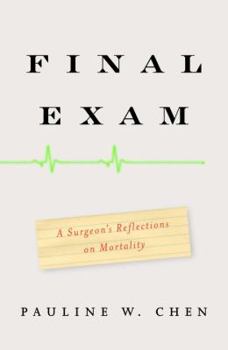Final Exam: A Surgeon's Reflections on Mortality
Select Format
Select Condition 
Book Overview
Customer Reviews
Rated 5 starsPhysician, Heal Thyself
Towards the end of FINAL EXAM, author Pauline Chen describes harvesting organs from a brain-dead patient who bore a strong physical resemblance to herself. Soon afterward she began to write stories, mostly about her experiences with patients. When she took a creative writing class, her teacher was clearly impressed by the authentic quality of what Chen had to relate and told her, "Pauline, you have to write these stories."...
2Report
Rated 5 starsHow Many Physicians Would Pass The Exam?
Pauline Chen is a surgeon who does liver transplants. She is also a fine writer as FINAL EXAM - A SURGEON'S REFLECTIONS ON MORTALITY proves so well. She writes with both passion and humility about the contradiction she sees in the field of medicine: that doctors, who witness death so often that it should almost become routine essentially are no better at dealing with the end of life than their patients are. (She actually uses...
1Report
Rated 5 starsHumbling!
"Final Exam" is humbling in at least two dimensions - producing greater respect for physicians (their knowledge and skill - both practicing medicine and handling grief and death), and reminding the reader that he/she is not immortal, and has over a 90% chance of dying from a prolonged illness - with plenty of time to reflect. Care at the end of life provides the theme for "Final Exam," and Dr. Chen takes us through her earliest...
2Report
Rated 5 starsGreat read
This book is really compelling, Dr. Chen brings you into her world and her work with clarity and a terrific knack for storytelling. Her love of medicine and her genuine appreciation for her patients as people, not just interesting problems, is extremely touching. Ultimately, she asks questions that dont just apply to medicine, but to society as a whole. How can our secularized society and our culture do a better job of facing...
1Report
Rated 5 starsa heartfelt account of how medical profession deals with death and dying
I read this book in one sitting! I HIGHLY recommend this fantastic read to anyone considering going to medical school, everyone IN medical school, and middle-aged readers who find themselves faced with the challenge of caring for aging parents. Chen's stories, told in a humble and genuinely caring voice, reveal the fascinating--and at times disturbing--realm of end of life care in the emergency rooms and operating rooms...
1Report














